Who organized the blue whale group. Blue Whale - missions that kill
Today, Internet games are actively spreading throughout all regions of Russia. Blue whale" and "Quiet House", which lure teenagers. Participants in groups on the VKontakte social network play the game for 50 days, in 50 stages. The end stage of the game, according to experts, is suicide - the player (teenager) must commit suicide. According to the rules of the game, children go online at 4.20 am and receive assignments. It all starts small: draw a blue whale on a piece of paper, etc., then they ask
make a drawing on the body, which, as it turns out, teenagers use sharp objects to scratch, always causing themselves pain. Moreover, they must demonstrate all this to the administrators of the mortal group. It turns out that teenagers use sharp objects to scratch, always causing themselves pain. Moreover, they must demonstrate all this to the admins of the mortal group.
According to media reports, dozens of suicide cases have been reported throughout the country. But there are also those who never decided to take this terrible step. They later told how they were drawn into the game, how they received tasks, and what they were threatened with if they refused the last stage of the “Blue Whale”.
If you check the statuses of the children participating in these groups, you can immediately understand that they are under strong psychological pressure.
“You don’t drink, you don’t lose your temper, I’ve never seen you cry, you’re afraid of losing self-control - that’s what I call giving up on life.”
"Nothing happens forever."
"I'm choking on words I'll never say and drowning on thoughts I'll never share." These and other similar publications can be found on the wall of a Blue Whale participant.
The Grozny-inform news agency correspondent invited Ella Sadykova, a psychiatrist, psychotherapist, and head of the women's (psychiatric) hospital of the Republican Psycho-Neurological Dispensary, to comment on the current situation.
Ella, have you heard about the new game “Blue Whale”, what can you say about this?
Blue whale... When I heard about this game, my surprise and shock knew no bounds. When describing it, the plots of many thrillers flashed through my head, with precisely such events. It is simple and easy to bring to life everything that some instigator and mentally ill person (there is simply no other way) saw or read somewhere. The plot of the game is not new. Only few people thought that it would be made a reality.
Describe this situation from the point of view of a psychologist...
The game initially causes excitement, it challenges, starting from simple, at first glance, tasks. As a result, the person is told: “die!” And between the lines “It’s hard for you to overcome me, you don’t control me, you can’t help but do what I tell you!” A person develops a sense of self-esteem, which until the age of 20-23 is built mainly on an emotional background, i.e. in society, and the logical chain is built on an emotional platform. From that moment on, the mousetrap slammed shut: completing task after task, a person receives satisfaction from his own Self and moves on with the firm conviction that he can stop at any moment. This is reminiscent of a gambling addict who bets something valuable over and over again. It's hit or miss, there's no other option. In the Blue Whale, among other things, they prohibit sleep; sleep deprivation is a dangerous thing in the hands of a manipulator. The psyche is a control system, and it just so happens that it is restored during sleep, which is why sleep is very important for health. When a person does not sleep for more than 24 hours, he ceases to fully control the course of his thoughts and actions, respectively. He is lethargic, tired, distracted and weak. In such a state, psychosis can occur, and he will simply lose control completely. If he is in a game, then under stress and from sleep deprivation, the player will do what he is told, simply because he will not be able to think clearly about anything.
What can you say about the organizers of this “game”?
The game manager is just a man with an inferiority complex who has never been listened to or respected. Those. gray mass... Just as emotionally immature as those who play this game. This is the best case scenario. Or he suffers from a mental disorder in a rough form, with delusional ideas of greatness... A person who enters the game unconsciously tries to overcome his internal barriers and complexes, in the game format he is more familiar, and no matter how old he is. Infantile people can be found at any age.
Ella Musaevna, how can we stabilize the situation with this mass psychosis of the younger generation?
I assure you, the slogans “Don’t be fooled”, “They won’t do anything to your parents”, “Don’t you dare die” are useless. I also want to say that no one is immune from this, no one.
Therefore, be attentive to your loved ones. No one knows what is in our subconscious, not even ourselves. Parents need to spend more time with their children, listen patiently about all the little things at school, problems in school, etc. Children in adolescence are especially dangerous; they generally feel that they are not understood. Therefore, I take this opportunity to urge parents to ask, be interested, and take part in the lives of their children. And yet, today we live in an age of new technologies. Therefore, I ask all parents, grandparents, teachers: if you do not limit your child’s presence on the Internet, then at least control what networks they visit, monitor who your children communicate with.
Various online marathons and quests are very popular among social network users. Unfortunately, not all of them are harmless. For example, the deadly quest “Blue Whale” has already ruined the lives of several children. How to save a child from a blue whale? Why is this game so popular among children?
The Blue Whale game is a type of online quest. Unfortunately, the name of the game does not at all correspond to its content. At the end of the game, the player commits suicide. If he doesn't do this, the organizers promise to do it for him. As a rule, teenagers become participants in the Blue Whale. They start playing out of curiosity. They feel like they can easily leave the game whenever they want. However, this is not so easy to do, because the organizers keep the players in constant fear.
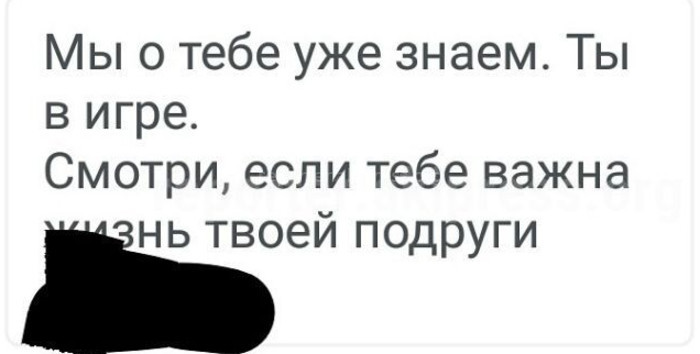 Why is the Blue Whale game dangerous? Firstly, it weakens the child’s psyche; he may experience panic attacks, bouts of depression, and nightmares. Secondly, if the teenager does reach the end, then he needs to commit suicide. And, unfortunately, today there are several cases where children managed to take their own lives.
Why is the Blue Whale game dangerous? Firstly, it weakens the child’s psyche; he may experience panic attacks, bouts of depression, and nightmares. Secondly, if the teenager does reach the end, then he needs to commit suicide. And, unfortunately, today there are several cases where children managed to take their own lives.
The danger of the Blue Whale game is obvious, but why do children continue to become participants in it? There is only one answer: “Curiosity.” Many people have the thought: “He couldn’t resist the organizers of the game, but I will reach the end and survive, nothing will happen to me.” But it seems so at first glance, because the concept of the game is built on keeping the player in constant fear. Over the course of 50 days (that’s how long the quest lasts), the participant receives tasks. After completing each task, he must reset the photo report. If he does not do this, the organizers begin to threaten him. As a result of such pressure, the child continues to participate.
The dangerous game “Blue Whale” - how does it start? In order to take part in the deadly quest, those wishing to do so must post on their wall a post with the hashtag #blue whale, #javigre or #Quiet House. After this, you can join the VKontakte group with the same name. The last step remains - write to the administrator, who introduces you to the rules of the game, and then issues the first task. The very first message to the participant says that there is no turning back, it is impossible to get out of it. And if he nevertheless changes his mind and refuses to participate, then his family will be in danger, since the admin has all the necessary information about him.
What tasks are given to participants?
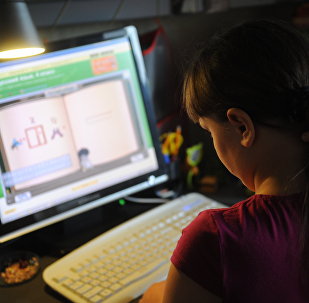 First, the child needs to scratch a special symbol on his hand with a blade, watch a scary video the next day, and make 3 shallow cuts on his hand. Gradually the tasks become more difficult. For example, on the 10th day of the quest, a teenager must go to the roof and take a photo on the edge, then stand on the edge of the bridge, stop communicating with other people, sit on the rails, etc. Throughout the game, administrators send children scary videos and music, communicate with them and intimidate them in every possible way. Many tasks need to be completed at 4.20 am. This time was not chosen by chance, because from a psychological and biological point of view it is considered the most difficult.
First, the child needs to scratch a special symbol on his hand with a blade, watch a scary video the next day, and make 3 shallow cuts on his hand. Gradually the tasks become more difficult. For example, on the 10th day of the quest, a teenager must go to the roof and take a photo on the edge, then stand on the edge of the bridge, stop communicating with other people, sit on the rails, etc. Throughout the game, administrators send children scary videos and music, communicate with them and intimidate them in every possible way. Many tasks need to be completed at 4.20 am. This time was not chosen by chance, because from a psychological and biological point of view it is considered the most difficult.
"Blue Whale": how to protect a child?
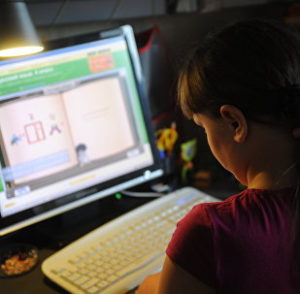
- Close your son or daughter's social network page from prying eyes. Let the information be available only to people you know well.
- Limit internet access at night.
- Try to find an interesting activity for your child to do offline.
Just a year ago everyone was talking about
Game "Blue Whale" tasks how to start playing
The rules of the game are such that a teenager must complete 50 dangerous tasks within 50 days. For example, draw a blue whale on your hand with a blade, while opening your veins. It is known that the final task is suicide. If the teenager does not kill himself, the organizers of the game promise to destroy his family and friends.
Let us note that last year the Russian segment of the Internet was struck by a previously unknown deadly novelty - suicidal games with various names, which became known as “death groups” and spread throughout the world. in social networks, especially on VKontakte, popular among teenagers.
A characteristic feature of such groups is the presence in the name of the words “Whales are swimming up”, “Wake me up at 4.20”, f57, f58, “Quiet house”, “Rina”, “Nya.bye”, “Sea of whales”, “50 days before mine..." Recently another name “Blue Whale” appeared. Distinctive hashtags were also referred to these groups: “domkits”, “milky way”, “150stars”, “ff33”, “d28”, “I want a vigru” and other phrases, pictures with images of whales.
“Subscribe to the “blue whale””, the call “wake me up at 4:20”, “Quiet House” - links that are understandable to every schoolchild. They transfer inquisitive teenagers to a public page with whales and pink horses - the page of the so-called “Death Groups”. It must be said that administrators of social pages tried to delete this kind of public, but pages with “beached whales” using the cloning method appeared again and again, but with a different address.
As of this month, more than 90 children have become victims of this game and its analogue “#quiethome” in Russia.
In order to get into the game or receive a task, children leave messages with the hashtags #I want a game and #wake me up at 420, less often #waiting for instructions in one of the “death groups” on the social network. It is these tags on the child’s page that will help the parent understand that he has taken a dangerous path.
"Blue Whale" game rules
The main reasons that push a child to participate in such games are the lack of parental attention and love, as well as the lack of socialization of the child in society.
“Parents feed the child, dress the child, do all the functional things. But man is a social being. He needs communication and moral encouragement from mom and dad. If this is not the case, children begin to look for support outside the family. Previously, it was the street, now it’s the Internet,” explained psychologist Natalya Archegova.
In closed groups, there was open propaganda for suicide, but it was presented in the form of some kind of quest, which, most likely, made these dangerous publics attractive to teenagers. Moreover, joining the group was not so easy; you had to prove your desire with a specific action, for example, inflicting various minor bodily injuries on yourself with special ingenuity.
After joining the group, the teenager embarked on the path of a potential suicide; suicide was the end result of the game. Before this, within 50 days, the minor had to complete 50 different tasks, which the minor received from the group administrator. There are reports of cases where a teenager was threatened with reprisals against his parents for refusing to take part in the next stage.
Game Blue Whale all tasks from 1 to 50
The first tasks simply arouse interest among the participants. First they are asked to draw a whale on paper. However, at one of the next stages, you need to depict a whale on your body, using sharp objects or a razor blade.
Note that “Run or Die”, “Blue Whales”, “Silent House” are not the only games with death, but simply the most popular recently. It will not be possible to isolate a child who studies in a large group exposed to certain popular trends from them.
According to psychologists, 12-14 years is a turning point for children. During this period, the authority of parents in the eyes of the child begins to fall, other idols appear, the first emotional declines occur due to unrequited love, and children with an unstable psyche easily fall under the influence of manipulators on the Internet.
If a parent notices that the child is interested in this game, then the best thing that can be done in such a situation is to talk with the child about faith, hope, love, the value of life, to let your child know that he is loved and accepted for who he is. It is very important to speak to him not down to him, but as an equal.
Loud debates about the safety of children on the Internet once again flared up after. The discussion subsided after the blocking of many communities that incite teenagers to commit suicide and the arrest of the administrator of one of them, Philip Lis. But now teenagers are again looking for information about the mysterious game "Blue Whale", and parents are sending each other warnings that the ending of this game is suicide.
On February 5 in Krasnoyarsk, a 13-year-old schoolgirl attempted to commit suicide. investigative committee opened a criminal case for incitement to suicide, considering that the reason for such an act was “messages provoking suicidal behavior.” “Recently, teenagers are increasingly becoming victims of so-called ‘death groups’ that call for suicide,” says the Investigative Committee’s website.
With the beginning of 2017, “death groups” on social networks began to increase their popularity again. The Regional Public Center for Internet Technologies (ROCIT) noted an increase in the use of characteristic hashtags: #bluewhale #f57 #d28 #quiet home #looking for a curator #whales are swimming up.” At the request of the organization, on February 6, the VKontakte administration blocked and deleted the previous hashtags of suicidal groups, and the activity moved to Instagram. According to ROCIT, since the beginning of February, about 45 thousand posts have appeared on Instagram with new, but very similar hashtags: #whale, #quiet, #blue, #blue_whale, #saveme, #I'm_in_the_game, #milky_way_far, #curatorwrite, #inGame. The majority of posts are published by residents of Moscow and St. Petersburg from eight in the evening to midnight.
“Friends, 50 thousand teenagers come to The Question from search every day for the last seven days to ask about the game “Blue Whale”. This is a game about suicide. We have reached an agreement with the Ministry of Emergency Situations help center and are sending children to their anonymous trust center. But if you know child psychologists, teachers, or just good adults who can give children something sane and kind to answer their questions about the meaning of life, tag them in the comments. And we will show where children need help. You can, of course, delete all the questions and ignore the children, but it’s somehow “as usual.”
Tonya Samsonova, founder of The Question
"The number of questions about the game and blue whales has increased sharply, I counted more than 50. Moreover, most of the questions are asked according to the same pattern: they ask what kind of game this is, how to get into it and how to play it,” writes Rustam Yulbarisov, editor-in-chief of The Question, in comments under one of the questions. He emphasizes that “there is no game,” and interest in this topic is artificially pumped up by communities that want to attract more users.
In 2017, there were already two reports of dangerous games occurring among teenagers. In early February, viral messages appeared on social networks about the game “Run or Die,” in which children have to run across the road in front of moving vehicles. They say that the warning was sent by the Department of Education, but the department doesn’t even know about the game. In January, there was false information on the Internet about a game called “24 Hour Disappearance” and linked it to the disappearance of children in the Rostov region.
Comments from some users under questions about blue whales indicate that this time the game does exist: after placing the appropriate hashtags on the page, the curator contacts the author, who begins to give tasks, for example, to carve a whale on the hand.
“My friend and I decided to check out what kind of sea of whales it was for ourselves, and made a couple of posts on a page on a social network with the hashtags “f57”, “sea of whales”. Assistants to the administration of these groups started writing to us, asking what was what, and convincing us that they were guides,” they say in the comments. Other users report warnings about the existence of the “game” being circulated among parents of schoolchildren.
The phrase “death groups” applies to communities on social networks that incite teenagers to commit suicide; they began to be actively used after the publication of an article by Galina Mursalieva in Novaya Gazeta in May 2016. In an investigation into mass suicides teenagers, it was claimed that 130 teenagers became victims of such communities.
The article talks about a girl who committed suicide following the rules of a “game” she was drawn into in one of the groups. Under the guidance of the “curator,” the girl performed tasks, the last of which was to jump from the roof. The girl’s mother found this out by studying her VKontakte page - correspondence and groups in which she was a member. Detailed retelling of the investigation " Novaya Gazeta" can be read in the material " ".
The publication quickly went viral - to date it has been read by more than three million people. The article was criticized for violations of journalistic ethics and controversial investigative methods. Nevertheless, the article caused a serious public outcry and opened a discussion about the safety of children online.
After the publication of the article, the Investigative Committee began an investigation into the case of inciting teenagers to suicide through VKontakte communities. In November 2016, the Investigative Committee incited Philip Budeikin, the administrator of the closed VKontakte group, to commit suicide. Under the pseudonym Philip Lis, he communicated with teenagers and sent them instructions for a “game”, the ending of which was suicide. The investigation identified 15 victims - teenagers who were members of “death groups” and committed suicide.
In December, the head of Roskomnadzor, Alexander Zharov, said that since 2012, 10,000 “death groups” and sites disseminating information about suicide have been blocked in Russia. After Budeykin’s arrest, Roskomnadzor worked with VKontakte and psychological experts to develop a methodology that will help quickly find groups promoting suicide and block them pre-trial.
Active monitoring of social networks really helps: in November in the Pskov region, law enforcement agencies reported the suicide of a teenager who announced on social networks his intention to commit suicide on his birthday. During interrogation, he admitted that he was pushed to suicide by the story of teenagers from the village of Strugi Krasnye, who, after a quarrel with their parents.
Parents may notice that the child needs help before the Investigative Committee intervenes in the matter - for this they need to build trusting relationships in the family. Psychologist Katerina Demina explains... And Olga Romanova in her column suggests remembering yourself as a teenager in order to understand that...
08 February 2017, Wednesday, 14:54 219713
2017-02-08T14:54:00+02:00 Life 2017-08-19T05:09:53+03:00
Ukrainian News
Ukrainian News
Game of Death: What is a “Blue Whale” and why teenagers perform deadly tasks


For many months now, the teenage game “Blue Whale” has been discussed on the Internet. Or “Silent House”, “Sea of Whale”, “Wake me up at 4:20”. The deadly game has many names, but the result is always the same - a completed life and grief-stricken parents who do not understand what made the child take his own life. Ukrainian News tried to figure out what the truth and fiction of the “whales” are.
The very first mentions of the “sea of whales” appeared on the Internet two years ago. Then this wave swept across all of Russia, everyone wrote about it, and a number of major publications conducted their own investigations. Even the administrator of one of the groups, Philip “Fox,” who encouraged teenagers to commit suicide in closed groups, was put behind bars. Participants were given tasks for 50 days, and in the final they were asked to perform “self-cutting.”

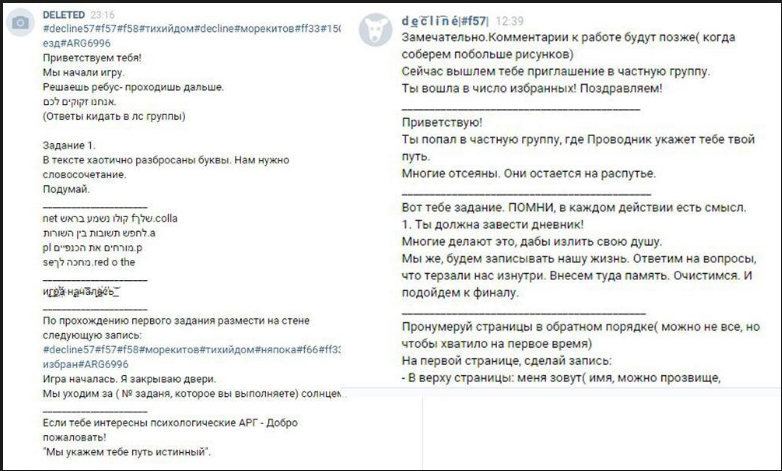
The conditions of the “game” were communication with chat administrators at 04:20, as well as carrying knives and making cuts on the hands. The basic principle is that a teenager allegedly writes a couple of messages on his page on social networks #blue whale, #quiet house, #yavigre #wakemeat420, #f57, #f58, after which a certain curator contacts him.







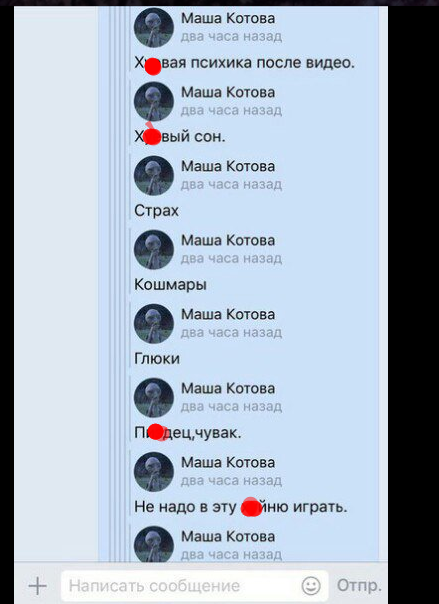
However, just cuts on your hands won't do. More recently, teenagers have new needs. For example, the quest "Run or Die". The child must run across the road close to the approaching car.
But this does not solve the main mystery - why do they do everything that the administrators of the “death groups” - often schoolchildren like their victims - order them to do?
There are many clues. Many teenage boys and girls have already faced very “adult” problems. Misunderstanding, uncertainty of the future and unrequited love, which at this age seems to be the only one, can cripple even an adult. And a teenager, oppressed by these things, comes to the thought that life is not as good as it seems. And helpful administrators deadly groups already ready with entire albums of sad monotonous music, imaginary support and understanding, as well as a huge amount pictures with depressing landscapes and words about hopelessness.





Teenagers are especially affected by the time at which group creators prefer to communicate with their victims - around 4:00. The gloomy pre-dawn time and virtually no sleep for a teenager sometimes confuses dream and reality, and actions feel unreal. It is then that the attackers find the moment to say: “Everything that is happening is a dream. Go out onto the roof, step off it, and wake up.”
And this is just one of the schemes. The second is threats against loved ones of a child who has become involved in such a group.
According to one of the group members, when he announced that he wanted to finish the game, the administrator sent him a link. And when the participant went through it, the administrator found out his IP address, from which he already calculated his physical address and even his apartment number. Following this, threats began to pour in regarding the disclosure of correspondence and the publication of intimate photos, which were also on the group’s “task” list. And many of those who have already passed away could have done so under fear of shame or the desire to protect their loved ones.
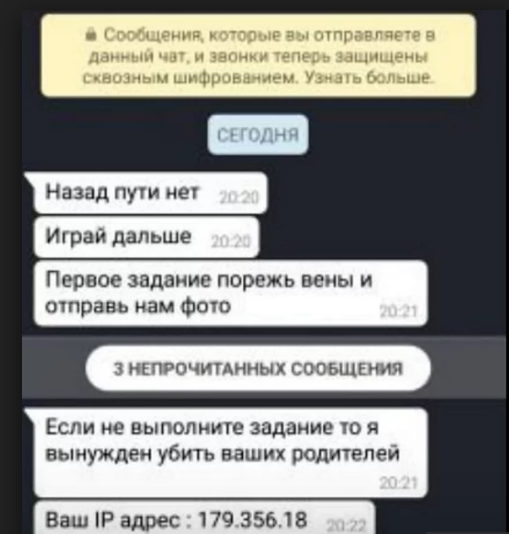
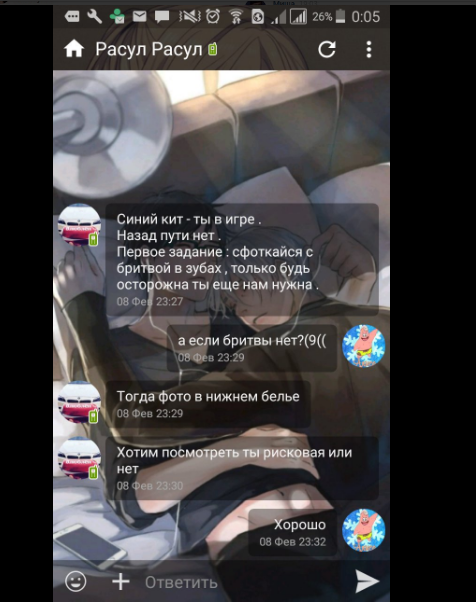
Many teenagers have problems in life that seem insoluble to them. Then they most strongly need the support and love of their loved ones - not demonstrative and optimistic, but help in understanding themselves and their world.
Let us remind you that Ukrainian News previously reported how “death groups” on social networks are pushing teenagers to commit suicide.
Earlier in Russia, teenagers opened fire on police officers, and after
